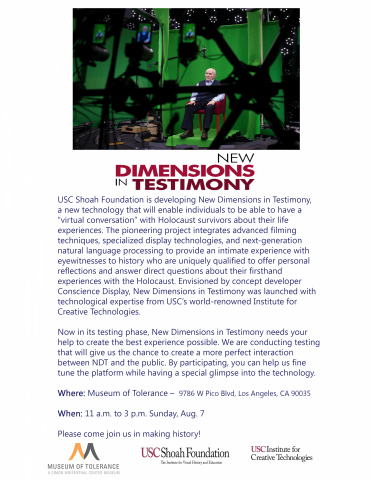
Armenian survivor Jiryar Zorthian explains how Turkish officials became nervous when Armenians began speaking out for their rights.
Armenian survivor Jiryar Zorthian explains how Turkish officials became nervous when Armenians began speaking out for their rights.
Ellen Kilston remembers the Nazis’ hiding of all anti-Semitic propaganda during the 1936 Olympics in Berlin. She further explains the role this deception played in shaping foreign perceptions of Jewish life under Hitler.
Diane Jacobs remembers watching Jesse Owens accept his medals at the 1936 Olympics in Berlin and the admiration she felt for his refusing to salute the Nazi flag.
Help USC Shoah Foundation test a new set of interviews for New Dimensions in Testimony at the Museum of Tolerance in Los Angeles.

USC Shoah Foundation, writer Robin Migdol sits down with Kia Hays project manager of New Dimensions in Testimony.
Highlights of the 2016 Master Teacher program in Budapest. A USC Shoah Foundation’s professional development initiative, Master Teacher (formerly Teaching with Testimony) is a two-year program that incorporates workshops, mentoring, and community building to prepare educators to search for and utilize testimony from the Visual History Archive, as well as other digital learning tools such as IWitness.
Carlos Mendes was the son of Aristides Sousa Mendes, Portuguese diplomat stationed in Bordeaux in the late 1930s who issued tens of thousands of visas to Jewish families, in direct violation of anti-Jewish laws instituted by Portugal’s fascist government at the time. Carlos Mendes reflects on his father’s fundamental willingness to risk his career and life to save persecuted Jews.
Carlos Mendes explains the sadness he feels for his father’s overlooked heroism and the pride he feels for the work his father did.
Aristides de Sousa Mendes was a Portuguese diplomat stationed in Bordeaux in the late 1930s who issued tens of thousands of visas to Jewish families, in direct violation of anti-Jewish laws instituted by Portugal’s fascist government at the time. For this act of resistance, Sousa Mendes faced trials and conviction, leaving him to live out the rest of his life in poverty and disgrace, and his 15 children scattered all over Europe and the U.S.
Esther Dresner expresses the gratitude she feels to Aristides de Sousa Mendes, a man who did the right thing, regardless of the price.
Aristides de Sousa Mendes was a Portuguese diplomat stationed in Bordeaux in the late 1930s who issued tens of thousands of visas to Jewish families, in direct violation of anti-Jewish laws instituted by Portugal’s fascist government at the time. For this act of resistance, Sousa Mendes faced trials and conviction, leaving him to live out the rest of his life in poverty and disgrace, and his 15 children scattered all over Europe and the US.